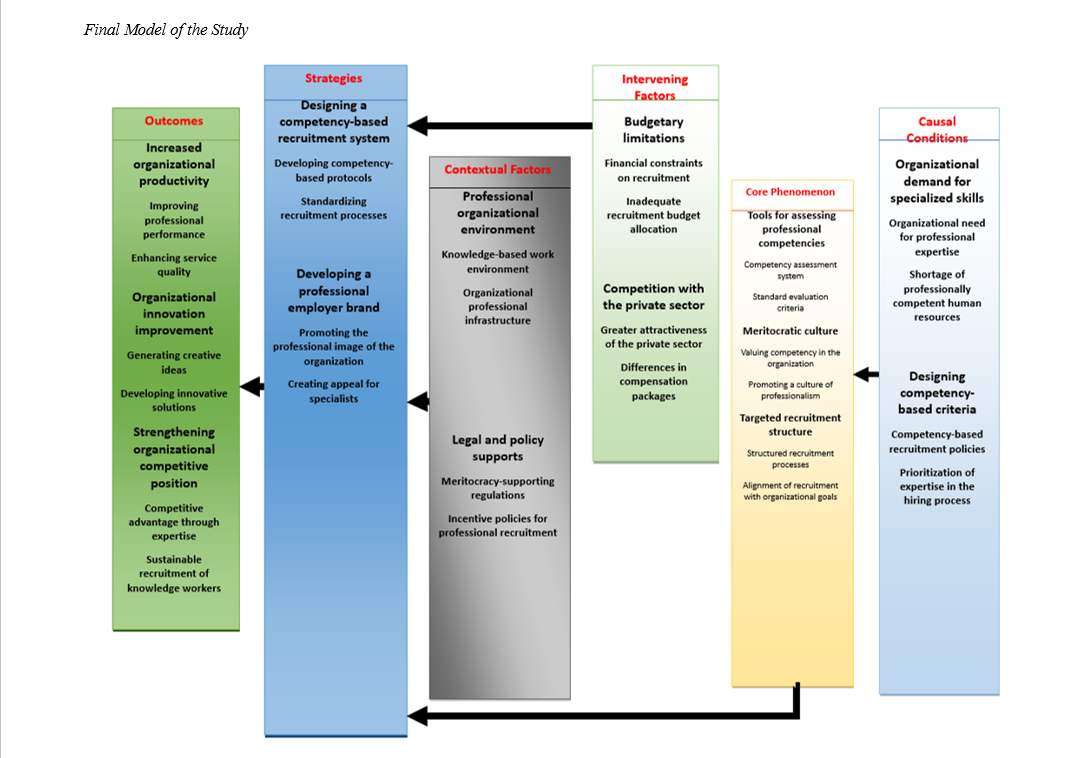Modeling the Recruitment of Knowledge Workers Based on Professional Competencies
Keywords:
knowledge workers, employee recruitment, professional competency, recruitment policiesAbstract
The purpose of the present study is to model the recruitment of knowledge workers based on professional competencies. In terms of its objective, this research is applied in nature, and methodologically, it is survey-based. The study adopts a qualitative approach. The statistical population consists of university professors and experts familiar with the recruitment of knowledge-based employees. In the qualitative section, their insights were utilized for the identification and coding of categories. Sampling continued until theoretical saturation was reached; thus, ten individuals were selected using the snowball sampling technique. The sampling method in this study is theoretical and purposive in nature. Data analysis was conducted using the grounded theory method. The research instrument was a semi-structured interview. The findings of the study indicate that, based on grounded data analysis, the causal conditions include the organization's need for professional expertise and recruitment policies based on competency. The core conditions include the competency evaluation system, a meritocratic culture, and a targeted recruitment structure. The contextual conditions involve a professional organizational environment and supportive legal and policy frameworks. The intervening conditions include budgetary constraints and competition with the private sector. The strategies entail designing a competency-based recruitment system and developing a professional employer brand. The consequences encompass enhanced organizational productivity, improved organizational innovation, and a strengthened competitive position of the organization.
References
Ariqat, R., & Abulaila, A. (2023). The Impact of Professional Competencies on Work Engagement in Palestinian Security Institutions: The Mediating Role of General Self-Efficacy. Arab Journal of Administration, 1-20. https://www.researchgate.net/publication/374055891_tathyr_alkfaat_almhnyt_ly_alankhrat_fy_alml_fy_almwsst_alamnyt_alflstynyt_aldwr_alwsyt_llkfat_aldhatyt_alamt
Atstsaury, S., Hadiyanto, H., & Supian, S. (2024). Principal's strategy to improve teachers professional competence. Munaddhomah: Jurnal Manajemen Pendidikan Islam, 5(1), 1-10. https://doi.org/10.31538/munaddhomah.v5i1.775
Bazaeva, F., Magomeddibirova, Z., & Uzdenova, A. (2024). Formation of professional competence among students in a pedagogical university. SHS Web of Conferences,
Choi, J. (2020). Development of a Competency for Infection Control Nurses in Korea. American Journal of Infection Control, 48(8), S36. https://doi.org/10.1016/j.ajic.2020.06.079
Cob, C., Zakaria, U. K., Wahab, M., Baistaman, J., Nur Zahirah, S., & Osman, N. (2024). Factors Influencing Job Performance among Academic Staff in Malaysian Public University. Information Management and Business Review, 16, 31-42. https://doi.org/10.22610/imbr.v16i1(I).3630
Collings, D. G., & Mellahi, K. (2009). Strategic talent management: A review and research agenda. Human Resource Management Review, 19(4), 304-313. https://doi.org/10.1016/j.hrmr.2009.04.001
Dadwal, S., & Arya, P. (2024). Impact of Competency Based Recruitment and Selection on Retention of Employees. International Journal of Research Publication and Reviews, 5(3), 3545-3548. https://ijrpr.com/uploads/V5ISSUE3/IJRPR23799.pdf
Doe, J., & Smith, A. (2023). A grounded theory approach to developing competencies of knowledge workers in human resource management. Journal of Human Resource Development Studies, 15(2), 45-68.
Horváthová, P., Čopíková, A., & Mokrá, K. (2019). Methodology proposal of the creation of competency models and competency model for the position of a sales manager in an industrial organisation using the AHP method and Saaty's method of determining weights. Economic Research-Ekonomska Istraživanja, 32(1), 2594-2613. https://doi.org/10.1080/1331677X.2019.1653780
Kotzab, H., Teller, C., Bourlakis, M., & Wünsche, S. (2018). Key competences of logistics and SCM professionals - the lifelong learning perspective. Supply Chain Management: An International Journal, 23(1), 50-64. https://doi.org/10.1108/SCM-02-2017-0079
Muzam, J. (2023). The challenges of modern economy on the competencies of knowledge workers. Journal of the Knowledge Economy, 14(2), 1635-1671. https://doi.org/10.1007/s13132-022-00979-y
Osagie, E. R., Wesselink, R., Blok, V., Lans, M., & Mulder, M. (2016). Individual competencies for corporate social responsibility: A literature and practice perspective. Journal of Business Ethics, 135(2), 233-252. https://doi.org/10.1007/s10551-014-2469-0
Rajabpour, E., & Soheili Nik, M. (2020). Competency and Career Anchors of Knowledge Workers. Fifth International Conference on Management, Accounting and Economic Development,
Shamiya, D. M. S. M. (2025). Job Satisfaction and Its Relationship to Professional Competency Among Government Employees in the Gaza Governorates. Researchers' Gateway Journal for Studies and Research, 1(2). https://www.researchgate.net/publication/393620926_alrda_alwzyfy_wlaqth_balkfat_almhnyt_ldy_almwzfyn_alhkwmyyn_fy_mhafzat_ghztJob_Satisfaction_and_Its_Relationship_to_Professional_Competence_Among_Government_Employees_in_the_Gaza_Governorates
Susanto, P., Hoque, M. E., Jannat, T., Emely, B., Zona, M. A., & Islam, M. A. (2022). Work-life Balance, Job Satisfaction, and Job Performance of SMEs Employees: The Moderating Role of Family-Supportive Supervisor Behaviors. Frontiers in psychology, 13. https://doi.org/10.3389/fpsyg.2022.906876
Ulrich, D., Brockbank, W., Johnson, D., Sandholtz, K., & Younger, J. (2008). HR Competencies: Mastery at the Intersection of People and Business. Society for Human Resource Management. https://www.researchgate.net/publication/329937572_HR_Competencies_Mastery_at_the_Intersection_of_People_and_Business
Wang, X., Li, C., Chen, Y., Zheng, C., Zhang, F., Huang, Y., & Birch, S. (2022). Relationships between Job Satisfaction, Organizational Commitment, Burnout and Job Performance of Healthcare Professionals in a District-Level Health Care System of Shenzhen, China. Frontiers in psychology, 13. https://doi.org/10.3389/fpsyg.2022.992258
Xu, C., Guo, L., Wang, K., Yang, T., Feng, Y., Wang, H., Li, D., & Fu, G. (2023). Current Challenges of University Laboratory: Characteristics of Human Factors and Safety Management System Deficiencies Based on Accident Statistics. Journal of Safety Research, 86, 318-335. https://doi.org/10.1016/j.jsr.2023.07.010
Zhang, S. X., Liu, J., Afshar Jahanshahi, A., Nawaser, K., Yousefi, A., Li, J., & Sun, S. (2021). Corrigendum to "At the Height of the Storm: Healthcare Staff's Health Conditions and Job Satisfaction and Their Associated Predictors during the Epidemic Peak of COVID-19". Brain, behavior, and immunity, 92, 243-244. https://doi.org/10.1016/j.bbi.2020.11.021

Downloads
Published
Submitted
Revised
Accepted
Issue
Section
License
Copyright (c) 2025 Faten Abed Mohsin AlRashid (Author); Zohreh Aghababaei Dehaghani; Abdulridha Faraj Badrawi Alkhammas, Mohsen Shariati Kamalabadi (Author)

This work is licensed under a Creative Commons Attribution-NonCommercial 4.0 International License.









